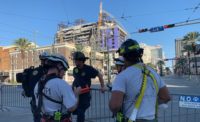New Jersey has ordered a contractor to halt all work statewide, related to worker underpayments and other violations at two project sites—the state’s first use of broad shutdown authority granted under a two-year old law.
The New Jersey Dept. of Labor & Workforce Development ordered Newark-based Cunha's Construction Inc. to stop work after finding the violations at Hindu temple construction sites for the BAPS sect in Robbinsville and Edison, state officials said.
It is the first time the state has stopped all work by an employer, rather than just at affected worksites. The labor agency ordered Cunha's to pay nearly $300,000 in back wages owed, fines and penalties, with the shutdown order in effect until all payments are made. It was not clear at ENR deadline the number of active jobsites in New Jersey for Cunha's, which is described as a general and residential contractor.
The state agency alleges that the contractor was paying workers in cash off the books and did not have workers’ compensation insurance, according to its news release. Other violations include failure to pay overtime and keep records, and hindering the state and federal investigation.
The agency also may assess a civil penalty of $5,000 per day against the firm for each day that it conducts business operations that are in violation of the stop-work order or a civil penalty of $5,000 for each individual who the firm failed to properly classify as an employee.
The Robbinsville temple opened in 2014 at a cost of $18 million, said nj.com, with work still continuing.
Firm owner Nuno Cunha did not respond to a request for comment. An appeal by Cunha's to the agency was denied, spokeswomqn Angela Delli-Santi said.
A separate federal district court lawsuit filed in New Jersey on May 11 on behalf of an estimated 200 workers charges the BAPS sect with a number of labor violations on the project, including wage theft and safety abuses, and use of religious visas for workers brought from India to “volunteer” at the temple. Spokespersons for BAPS denied the charges in comments to The New York Times and other media.
“The authority to stop bad actors in their tracks by taking away their ability to turn a profit by exploiting workers is a powerful new tool in our arsenal, Delli-Santi said. "We target industries in which we know misclassification is more prevalent, and construction is one of those." She pointed to its transient workorce and short turnaround time on projects.
Cunha's also has eight unpaid judgments for back wages and penalties dating back to 2007 that have not been resolved by way of compliance or restitution to workers, the state agency said.




